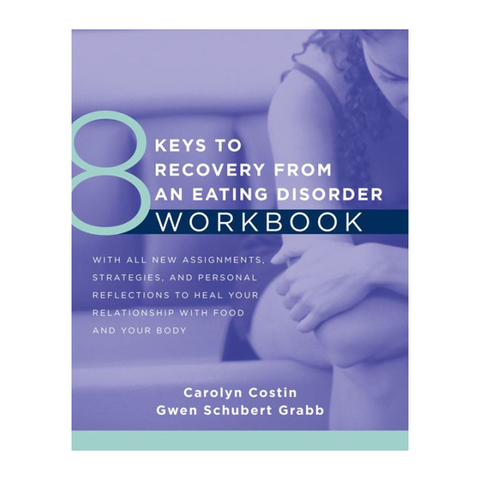Three years ago, Abigail O’Laughlin sat in the parking lot of a Chick-fil-A in Destin, Florida, her heart racing. She was meeting her eating disorder recovery coach, and they were planning to eat one of the foods she feared most.
A chicken sandwich might not seem like a big deal to some, but two of the hallmarks of anorexia are creating rigid eating rules and restricting food groups. O’Laughlin had loved the meal as a kid but hadn’t let herself eat it for years, not since she had been diagnosed with the eating disorder at age 14. Her coach, Sarah Lee, a warm, upbeat woman with a Texas twang, sympathized—she had recovered from bulimia herself more than a decade before.
As the pair ordered, O’Laughlin’s anxiety swelled, but Lee talked her down, and they ate together, doing mindfulness exercises in between bites. Slowly, O’Laughlin’s panic began to subside and an unfamiliar feeling dawned: confidence. She was doing it—eating whatever she wanted. “It was a huge milestone for me,” O’Laughlin says.“The sense of freedom didn’t come immediately, but it was like the chains were starting to come off.”
Coaches like Sarah Lee are a new and fast-growing phenomenon in the field of eating disorder treatment. These mental illnesses are notoriously hard to recover from: The underlying psychological issues develop over years and take time to work through. Denial and secrecy are common, and sufferers can’t simply turn their backs on food. (Imagine an alcoholic needing to drink moderately three times a day while in recovery.)
Rates of relapse, depending on how it’s defined, can range between 9 and 52 percent, according to a 2017 review of 27 studies published in the Journal of Eating Disorders. These disorders also have some of the highest mortality rates of any mental illness—a 2011 meta-analysis of 36 studies published in the Archives of General Psychiatry found the rate to be about 5 percent in people with anorexia. “Eating disorders often require a lot of treatment for someone to reach recovery,” says Ilene Fishman, a therapist, and a clinical adviser and board member at the National Eating Disorders Association. “It’s expensive and hard for people to access the care they need—both quantity and quality.”
Enter coaching, which aims to bridge the gap between doctors, therapists, and dietitians and a client’s friends and family, who may be overtaxed or uncertain how to help. In May 2017, a pioneer in the field, Carolyn Costin, coauthor of the seminal book 8 Keys to Recovery From an Eating Disorder and founder of the first residential treatment center, Monte Nido, in Malibu, California, established a rigorous eating disorder coaching certification program. The course, which can take up to a year and a half, trains coaches to work with people who have clinical eating disorders. To date, there are 62 certified coaches worldwide, from New York to Melbourne, and 49 others currently in training. Approximately 97 percent of the program’s coaches have recovered from their own eating disorders.
When Costin, a therapist, first founded the program, some other therapists balked, worrying coaches would encroach on their work without adequate training or oversight. But Costin emphasizes that coaches don’t replace therapists but work in tandem with them, focusing on developing skills for daily life rather than exploring past issues. “Coaches are in the trenches with clients,” she says. “Therapists and dietitians don’t have the time to go to a gym or a restaurant with their clients. But these are things that are necessary for recovery.”
Eating disorder coaches, much like sober coaches, will often make themselves widely available, responding to texts and calls at all hours. O’Laughlin’s coach Sarah Lee helps her clients grocery shop, prepare meals, and organize kitchen cabinets, and joins them at family meals and on clothes-shopping trips. She also guides them in visualizations and has persuaded some to dismantle the scales and cut up the measuring tapes they use to evaluate their bodies.
Other coaches, such as Thousand Oaks, California–based Lori Lee (no relation), host virtual and in-person coaching sessions, and will even stay in clients’ houses for weeks or months at a time, often after inpatient treatment. “Recovering from an eating disorder is like trying to get out of a dust storm—you’re not sure which way to turn, and things are confusing and hard and anxiety-provoking,” says Caryn Raba, a New York-based coach who consults domestically and internationally. “To have someone grab your hand, act as a guide, and walk you through it can be really important and valuable.”
Eating disorder recovery coaching is so new that no studies have examined its effectiveness, but research in other fields has uncovered the benefits of peer-like mentorship. In addiction recovery, for example, it can reduce relapse and rehospitalization, and increase treatment retention, according to studies.
One of Raba’s clients, a therapist and fitness instructor from California, had struggled with anorexia since she was eight years old, enduring expensive therapy for four decades. “Nothing helped. I had never not been at war with myself,” she says. “I could text Caryn when I was making food. I could call her when I was eating. I was able to chip away at my habits inch by inch. It was the nuts and bolts of ‘I’m at the grocery store, help…I just want to buy lettuce, but I know I shouldn’t.’”
Some professionals have yet to warm up to the practice, however. Fishman worries that certain coaches might not be recovered enough to help—or that treatment could get diluted. Others are concerned about the lack of federal oversight. “Theoretically, any person could say, ‘Now I’m a coach,’” says Rebecca Eyre, an eating disorder therapist and CEO of Project HEAL, a nonprofit that helps those with eating disorders access and afford care. “That does worry me, but the certification program helps define it.”
Still, some clients say they cycled through years of expensive treatment and relapse, and nothing worked until they got a coach who could fill in the missing pieces of their recovery. Other clients who’ve experienced only mildly dysfunctional eating habits say that working with a coach prevented a more precipitous descent into a full-blown eating disorder. “Having a coach was the first time I felt like I wasn’t just another patient,” says Caitlin Crawford, a Los Angeles–based singer-songwriter who has been in recovery from anorexia and bulimia for over four years. “It’s definitely a game-changer.”
This article first appears in the August 2021 issue of ELLE Magazine.
This content is created and maintained by a third party, and imported onto this page to help users provide their email addresses. You may be able to find more information about this and similar content at piano.io

